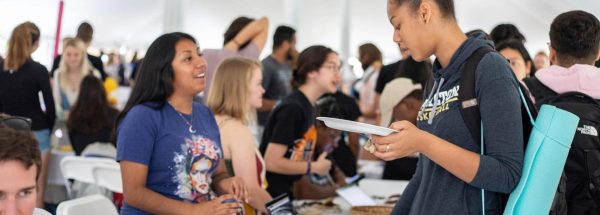Hamilton College’s open curriculum continues to be one of the most prominent features of this school that allows students to shape their education around their individual interests and passions. With a plethora of concentrations to choose from, many students find the freedom to explore courses outside their departments both rewarding and eye-opening.
For Chloe Richards-Boeff ‘28, being a Psychology major has expanded her curiosity as a learner. “Understanding cultural backgrounds, history and context is extremely important to understanding someone as a person,” she explained. Richards-Boeff has used the open curriculum to explore history courses that deepen her understanding of cultural and historical factors that may influence human behavior, which, as a result, has deepened her knowledge that she believes is invaluable in her goal of becoming a clinical psychologist. Outside of academics, Richards-Boeff’s involvement in campus life reflects her interests. “I like to use my club time to fulfill my other interests in performance, comedy and making a change in my community.” When it comes to whether Hamilton is a good space to grow with her major, Richards-Boeff had mixed feelings. “On one hand, I think the workload and harsh grading discourage curiosity,” she noted. “But at the same time, Hamilton helped me realize that pre-med wasn’t for me and that psychology was where my true passion lies.”
For Nawar Kazi ‘27, a Data Science major, the open curriculum has allowed her to be academically flexible. “Many people think data science has too many requirements,” she said, “but it hasn’t stopped me from taking classes I’m interested in.” This semester, Nawar is taking an Asian Studies course titled Islam and Politics in Asia, a choice that connects with her academic curiosity that lies beyond the STEM field she is used to. “When I first came to Hamilton, I thought I’d be a sociology major,” she explained: “I’ve switched between the two over the past two years and I’ve still managed to stay on track thanks to the open curriculum.” Nawar’s academic journey also extends beyond the classroom. Over the summer, she interned at Columbia University’s Irving Center for Cancer Dynamics where she combined her knowledge of sociology and data science in bioinformatics research. “Without Hamilton’s open curriculum, I don’t think I would have been as prepared to tackle such an interdisciplinary field,” she reflected. “It really allowed me to approach problems from multiple perspectives.”
An anonymous psychology major also shared how Hamilton’s flexible structure shaped their academic experiences. “When I came to Hamilt=on, I was set on majoring in psychology,” they said. “But after taking classes in the art, religious studies and sociology departments, I’ve realized how interconnected these fields are.” They emphasized that being able to explore different disciplines without worrying about falling behind on requirements has made their academic experience more meaningful. This student also highlights how extracurriculars complement their studies. “ROOTs, a club for students of colors in STEM, has been an incredible space for support and connection,” they shared. “It allows us to meet professors, connect with peers in similar concentrations and grow both academically and socially.” However, they also acknowledged that psychology at Hamilton has its limitations. “Research positions are really competitive, and some classes feel repetitive,” they said. “But opportunities like being a Peer Listener or helping professors with research still make the major worthwhile.”
Through these responses, one thing is clear: Hamilton’s open curriculum offers students the freedom to shape their academic journeys in ways that align with both their intellectual and personal goals. Whether it’s combining psychology with history, bridging data science and sociology, or finding meaning in interdisciplinary exploration, students continue to make the most of Hamilton’s promise of educational freedom.
